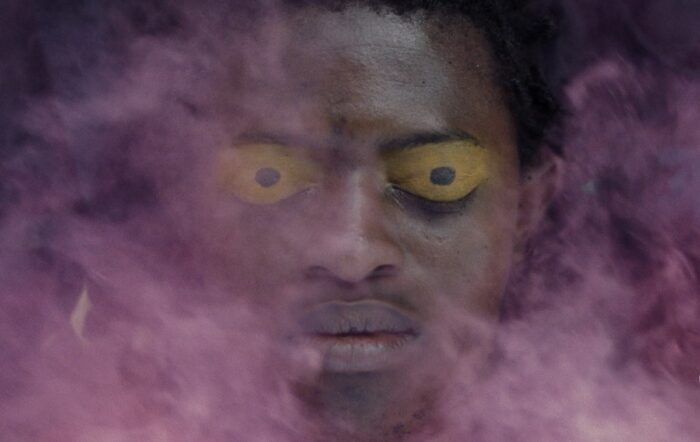It’s always a nerve-wracking experience taking your significant other home to meet your family, especially when you come from a very traditional cultural background. You all know how it is, right? You go home, nothing’s changed, you make awkward conversation, they make backhanded remarks, they give you an exorcism and nail a block of wood to your head…. We’ve all been there. Just like in Omen.
You see, for Koffi (Marc Zinga), taking his fiancée Alice (Lucie Debay) home to meet his folks is an especially fraught business. He has a prominent birthmark, and is both epileptic and prone to nose bleeds, and in their eyes, that means he’s “Zabolo”, marked by the devil. So no, he’s not what you could call “close”, with his family. But, duty demands that he and Alice deliver them a dowry before their union and so after twelve years in exile, Koffi makes the trip back to Congo to bring it to them and, well it wouldn’t be much of a movie if it all went smoothly and no, it sure doesn’t.
Omen is the feature film debut of Belgian rapper and filmmaker Baloji and joins the ranks of modern films exploring the experience of exilic Africans, born in Africa yet mostly raised in Europe with Western values that conflict with those of their parents. Omen approaches this conflict from a particular privileged position, able to both sympathize with and freely ridicule traditional Congolese beliefs about witchcraft. I say traditional, but of course, nothing in Africa was untouched by European colonization, their religion included, and so the tribal customs embraced by the communities depicted in Omen are a hybrid of European and African religions, as tellingly displayed when Koffi and Alice ask what their new nephew is called, and are given two responses, one Congolese name, and one Catholic one. This conversation is followed by a faux pas that leads to the aforementioned exorcism ceremony, a sequence that articulates both Koffi and the film’s complex relationship to mysticism. It’s both funny and frightening as both audience and characters are left unsure exactly how concerned they ought to be. It’s reminiscent almost of a culturally inverted version of Get Out, with the mixed race couple subjected to a hellish and potentially life-threatening encounter with the in-laws.
Lots of low-budget indie movies these days feel the need to court horror markets, but Omen is decisively a drama and the hair-raising or fantastical elements are organic elements to the storytelling and complimented too by a deft hand in comedic deflation, employed gracefully at select moments, bringing the culture shock elements of the story to the fore in a way that’s refreshingly un-self-conscious. Balaji is enough of an outsider to find this stuff truly bizarre, but enough of an insider to see the humor in that strangeness without coming across crass or disrespectful. The film strikes an admirable balance between respectful depiction and rationalist critique, embracing the symbolic and aesthetic nature of the beliefs while still portraying their negative psychological effects and social function. Koffi was legitimately traumatized by the stigma his family placed on him, his mother rejects him and his father avoids him, and he’s struggling to let go of his desire for their approval.
However Koffi’s ill-fated attempt to rebuild a relationship with his parents is not the only thread Omen is weaving and the film soon draws in other characters, to each of whom is roughly devoted one of the film’s four chapters. We first meet Koffi, then his free-spirited polyamorous sister Tshala (Eliane Umuhire) who is also planning her escape from this restrictive community, then his mother Mujila (Yves-Marina Gnahoua) in her mourning, herself a prisoner to the patriarchy she has dutifully upheld, and finally Paco (Marcel Otete Kabeya), a genderfluid street kid who performs magic tricks, and is hounded out of his home by a rival street gang, a horrifying experience no doubt, though I will say not many thugs bring marching bands along to soundtrack their hate crimes. Through these loosely interconnected threads, we see an inter-generational vertical slice of this community and the different relationships each of its inhabitants have to the mystic sublime in whose shadow they have each been raised and by which many have been traumatized.

Dream sequences are used throughout to exposit on characters’ backstories and emotions, showing us not merely what happened, but how the character’s subconscious internalized what happened. Paco’s sister died some kind of violent death—he and his troupe wear dresses of pink rags to honor her memory—the exact nature of which is unclear as it is presented only via a dream sequence, wherein Paco reimagines the event as a kind of Hansel and Gretel style fairy-tale that’s truly nightmarish to behold. With some very simple elements, Baloji crafts some very effectively haunting imagery, mixing the imagined and the literal and allowing them to fluctuate. By the time we’re following Mama Mujila, we shift between dream and reality without signposting, the surreal final scene a haunting and painful requiem for a damaged family and culture making one last ditch effort to heal itself.
It may be disjointed in many ways, with some parts left too under-explained but the bold, personable vision presented in Omen is vivid, unexpected and humane in all the best ways. The characters are drawn with necessary depth and credibility, with nuance and sympathy discovered in every corner of its story, and the performances are poised and profoundly moving, each actor finding the inner heartbreak of their part and bringing it out. I sincerely hope this film finds its audience as there’s so much talent at play here, few can manage this kind of balance between striking imagery and a rock-solid foundation of character. I can’t wait to see what Baloji could deliver us if granted more resources.




